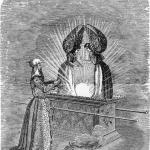Including a Brief Examination of the Views of the Church Fathers

Edward Josiah Stearns (1810-1890) was an Episcopal clergyman from Maryland and author of several books. His volume, The Faith of Our Forefathers (New York: Thomas Whittaker, 1879), was a reply to The Faith of Our Fathers (1876), by James Cardinal Gibbons (1834-1921), one of the best and most well-known Catholic apologetics works, with an emphasis on scriptural arguments and replies to Protestant critiques of Catholicism. It had sold over 1.4 million copies by the time of its 83rd edition in 1917 and was the most popular book in the United States until Gone With the Wind was published in 1939. This volume highly influenced my own development as a soon-to-be Catholic apologist in the early 1990s: especially with regard to my usual modus operandi of focusing on “biblical evidence” for Catholicism.
The words of Rev. Stearns will be in blue. I use RSV for biblical citations.
***
In Rev. Stearns’ Chapter XIII (“The Invocation of Saints”) he makes various arguments against the practice of invoking saints, after freely conceding that “intercessory prayer is availing, and . . . the dead in Christ pray for those still in the flesh. This is what all Christians admit” (p. 188). The first way he attempts to do this is by appearing to deny the particular judgment. In other words, if the saints are not yet in heaven before the Second Coming, then they couldn’t be asked to pray for us, since they would be unable to do so, lacking the extraordinary capabilities that heaven grants (so his faulty reasoning goes). Thus he uses a denial of the particular judgment as a (futile) means to undercut the invocation of saints, as he states outright:
The foundation of the Roman doctrine, that ”the saints reigning together with Christ are to be venerated and invocated,” being thus taken away, the superstructure would seem likely to go with it. (p. 191)
Here’s how he argues his point:
I suppose it will be admitted that if there are any saints now reigning with Christ, St. Paul must be one of them. Is St. Paul, then, reigning now with Christ? In other words, has he already got his crown? Let him speak for himself (2 Tim. 4:1, 8): ”Who shall judge the quick and the dead at his appearing and his kingdom, . . . Henceforth there is laid up for me a crown of righteousness, which the Lord, the righteous judge, shall give me at that day: and not to me only, but unto all them also that love his appearing.” Words could not assert more plainly that the crown is to be given to all Christians at one and the same time, and that time the “day” of his ”appearing,” to ” judge the quick and the dead.” When, therefore, the Apostle elsewhere speaks of the departed as being with Christ, he means, not that they are in heaven reigning with Him, but that they are in paradise (that part of hades (St. Luke 16:23) where Abraham and Lazarus were) enjoying the manifestation of Christ’s presence, “resting from their labors” (Rev. 14:13), and waiting for “the glory which shall be revealed” (Romans 8:18). So St. Paul says, and so says ”the Prince of the Apostles”: “And when the chief Shepherd shall appear, ye shall receive a crown of glory that fadeth not away” (1 St. Peter 5:14). And so says our Lord Himself to His Apostles (St. Matt. 19:28), “In the regeneration when the Son of Man shall sit on the throne of his glory, ye also shall sit upon twelve thrones, judging the twelve tribes of Israel.” (pp. 188-189)
Catholic apologist Tim Staples explains the Catholic belief in the particular judgment:
- Yes, we must believe as Catholics that there is what the Church refers to in the Catechism (1022) as the “particular judgment” immediately upon the death of each human person:
Each man receives his eternal retribution in his immortal soul at the very moment of his death, in a particular judgment that refers his life to Christ: either entrance into the blessedness of heaven—through a purification or immediately—or immediate and everlasting damnation.
This truth is attested to in texts of Scripture like Hebrews 9:27: “It is appointed for men to die once, and after that comes judgment.” And it is implied in Luke 16:19-23, when Jesus gives us his famous parable of Lazarus and the rich man. The rich man lived lavishly in this life, whereas poor Lazarus languished in poverty, but upon their respective deaths, they each went immediately to their eternal reward. Poor Lazarus entered into paradise [Hades: 16:23], whereas the rich man entered into eternal damnation (CCC 1021, footnote 593). The particular judgment of each is a necessary inference in order to make sense of the text. . . .
2. We must also acknowledge as Catholics that there will be what the Church refers to as the Final Judgment at the end of time, in which all will be judged corporately and publicly. According to Sacred Scripture, this is clearly separate and distinct from the particular judgment, as CCC 1038 declares:
The resurrection of all the dead, “of both the just and the unjust” (Acts 24:15), will precede the Last Judgment. This will be “the hour when all who are in the tombs will hear [the Son of man’s] voice and come forth, those who have done good, to the resurrection of life, and those who have done evil, to the resurrection of judgment” (John 5:28-29).
Then Christ will come “in his glory, and all the angels with him. . . . Before him will be gathered all the nations, and he will separate them one from another as a shepherd separates the sheep from the goats, and he will place the sheep at his right hand, but the goats at the left. . . . And they will go away into eternal punishment, but the righteous into eternal life” (Matt. 25:31, 32, 46). (“Judged, Then Judged Again,” Catholic Answers, 5-13-24)
The Catholic Encyclopedia, in its article, “Particular Judgment” (1910) elaborates:
The Scriptural arguments in defence of the particular judgment must be indirect. There is no text of which we can certainly say that it expressly affirms this dogma but there are several which teach an immediate retribution after death and thereby clearly imply a particular judgment. . . . To the penitent thief it was promised that his soul instantly on leaving the body would be in the state of the blessed: “This day thou shalt be with me in Paradise” (Luke 23:43). St. Paul (2 Corinthians 5 [esp. 5:7-8]) longs to be absent from the body that he may be present to the Lord, evidently understanding death to be the entrance into his reward . . . other texts that have been quoted are sufficient to establish the strict conformity of the doctrine with Scripture teaching. (Cf. Acts 1:25 [“this ministry and apostleship from which Judas turned aside, to go to his own place”] . . . ).
See also, Catholic Encyclopedia, “General Judgment.” Another Catholic article adds:
Hebrews 12:23 presents “the assembly of the first-born who are enrolled in heaven, and … the spirits of just men made perfect” — a very clear indication of the eternal life already received by worthy Christians who have passed on. (“A Scriptural Defense of the Saints in Heaven,” The Lonely Pilgrim, 9-15-13) [cf. also, 1 Cor 13:12; Phil. 1:23]
Rev. Stearns then attempts to argue (by citing relatively obscure Catholics) that the particular judgment was denied by the Church fathers Irenaeus, Justin Martyr, Tertullian, Clement of Rome, Origen, Ambrose, Chrysostom, Augustine, Lactantius, and Theodoret. Rev. Stearns then triumphantly declares that all that can be found in favor of the doctrine of particular judgment is Dionysius of Alexandria and a “doubtful” statement of St. Cyprian, and that “This is absolutely all that I have been able to find, and I challenge the Archbishop to produce any more” (p. 190).
Anglican Church historian J. N. D. Kelly (Early Christian Doctrines, HarperSanFrancisco, 1978 edition) thinks differently. He notes “great uncertainty, not to say confusion, seems to have prevailed among the Greek fathers” (p. 482) but then mentions several major fathers who did indeed believe in the doctrine. Keep in mind that Rev. Stearns claimed that only Dionysius of Alexandria accepted it. But Kelly writes:
Chrysostom . . . explicitly allows for [In 2 Tim. hom. 3, 3] two moments of divine retribution, one at death and the other at the resurrection. So he can speak [In 1 Cor. hom. 42, 3] of a ‘tribunal’ before which the dead are instantaneously haled, and he reads [De Laz. hom. 1, 11; 2, 2 f.; 5, 3; 6, 6; 7, 4] the parable of Dives and Lazarus as implying that sanctions are applied to good and bad immediately [after] they depart this life. . . . The righteous, according to Hilary, [Tract. in ps. 51, 22 f.; 57, 5; cf. ib. 2, 48] rest in Abraham’s bosom, while the wicked begin to pay the penalty which the Last Day will ratify. Ambrose is quite clear [De hom. mort. 45-7] that there are ‘storehouses’ . . . where the souls will await the doom which will be pronounced at the judgment, and while they wait will receive a foretaste of its quality. . . . Jerome . . . stated [In Ioel 2, 1] that ‘what is in store for all at the day of judgment is fulfilled in individuals on the day of their death’ . . . Augustine‘s explicit teaching [De praedest. sanct. 24; cf. enchir. 109] was that in the intermediary period between laying aside the body and later resuming it human souls either undergo torture or enjoy repose, according to their previous conduct in this world. His language [E.g. serm. 109, 4; de civ. dei. 20, 1,2] indicates that he regarded this as the consequence of the divine judgment, while reserving [De civ. dei. 20, 1, 2] the term ‘day of judgment’ in the strict sense the the great assize at the end of the world. (pp. 482-483; bolding my own)
Tertullian made an exception for martyrs, whom he thought were immediately received into heaven (De anima 55; De carnis resurr. 43). St. Cyprian thought that the just souls enter the kingdom of heaven and attain to Christ (De mortalitate 26). St. Caesarius of Arles also directly taught the particular judgment (Sermo 5, 5).
*
***
*
Photo credit: Saint Jerome in His Study (1451), by Antonio da Fabriano (1420-1490) [public domain / Wikimedia Commons]
Summary: Anglican Edward Josiah Stearns (1810-1890) tried to dismiss invocation of saints by denying the doctrine of the particular judgment. Scripture and the fathers disagree.













